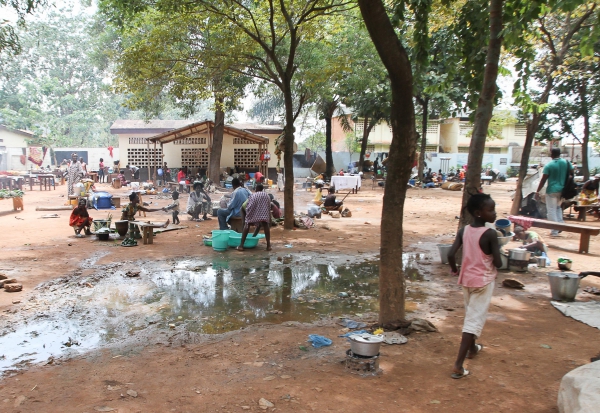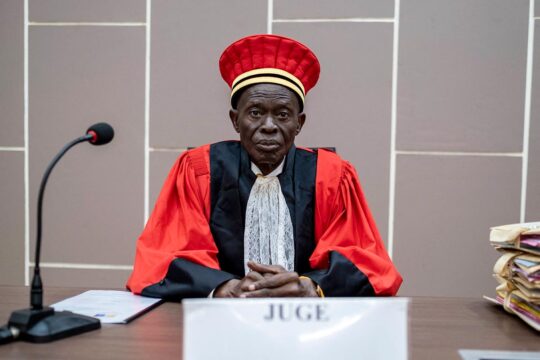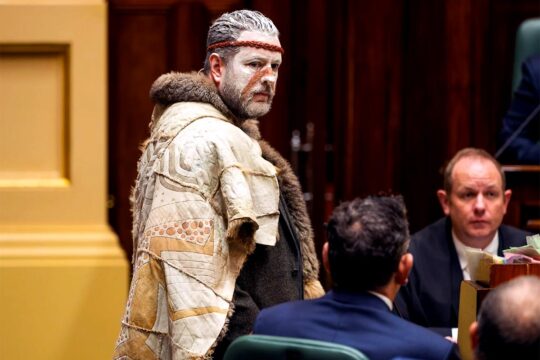In an unusual move, members of the Central African Republic’s transitional parliament (CNT) on Wednesday staged a peaceful march in Bangui denouncing the failure of the transitional government and international forces to end inter-communal violence in the country. This was despite a government order saying their march was “in flagrant violation of administrative rules”.
At the end of September at least 60 people were killed in inter-communal clashes in Bangui. And a month later, a new wave of violence in the capital left at least ten people dead and thousands displaced.
Led by CNT chairman Ferdinand Nguéndet, the transitional MPs marched from the parliament building in the fourth arrondissement of Bangui to the “United Nations Square” roundabout, with banners including “Central Africans united and indivisible in peace”, “One country, one army” and “Yes to rearming FACA (Central African Armed Forces) and involving them in pacification”.
“We want concrete actions from the government,” said Nguéndet’s first advisor at the end of the march. “The government has a historic responsibility and has promised to ensure the security of the people. It is now the duty of the government and the international community to integrate our defence and security forces within a week into the process of bringing security to the country.”
According to the CNT chairman, Central Africans have waited too long for this. “At the time we questioned the UN Secretary General’s representative Babacar Gaye on the implementation of various resolutions adopted by the UN,” he said. “Today, the facts speak for themselves. The facts prove that national representatives who said it would be impossible to bring security to Bangui and the interior of the country without our defence and security forces were right.”
Reaction of the UN Special Representative
The “honourable marchers” then handed to Parfait Onanga-Anyanga, successor to Babacar Gaye, a memorandum reiterating their grievances against the UN mission in the CAR (MINUSCA). According to UN Security Resolution 2149 of April 10, 2014, says the memorandum, the UN’s mandate “includes several things, of which the most important are protection of civilians in physical danger, support to the transition to extend the authority of the State, and support to the process of Disarmament, Demobilization and Reintegration of the former combatants”. The failure of this DDR process is partly at the root of the continuing violence.
“In view of continuing acts of violence causing the deaths of several people by gunshots or throat slitting, the destruction and looting of personal property and clashes between armed groups in the capital Bangui, and given the tragic events that have been going on in the southwestern section of Bangui for at least a week, the CNT feels that MINUSCA is not yet fully carrying out its mandate,” the text continues. The CNT is therefore asking MINUSCA to “strengthen its patrols and set up forward posts of its teams in the eight arrondissements of Bangui” and to “support the rearmament of the Central African Armed Forces and their inclusion in operations to secure and pacify the country”.
Reacting the same day in his weekly press conference, the UN Special Representative reiterated that the UN’s mission is to re-establish peace and stability in the country. The Gabonese diplomat stressed “the extent of efforts by the Mission to bring security to the CAR”, especially after the recent murderous events in Bangui. He said new measures to strengthen security included more patrols in sensitive areas of the capital.
The head of MINUSCA said he had heard the appeal of the Central African authorities on the arms embargo, rehabilitation of the national armed forces and their participation in security operations. “We hear the calls for the FACA to be brought back into play,” he said. “We never said no. These are decisions taken by the UN Security Council, and the constructive dialogue that the UN sanctions committee has had with the Central African authorities could permit a relaxation of the current sanctions. I have myself sent a letter to the head of the sanctions committee asking that internal security forces be given the means to conduct security operations in Bangui in collaboration with the international forces present. There are procedures, and they must be respected.” Alluding to the dubious past of the FACA, Ban Ki-moon’s special representative also commented that “the CAR needs an army that respects Republican values. It needs an army that is ethnically balanced and has members from all parts of the country.”
Pope Francis due to visit shortly
Complaints against the UN mission were also expressed on Monday by transitional president Catherine Samba-Panza who, unlike the CNT, nevertheless refrained from shouting them in the street. “The recent dramatic events coming one month after those of September 26 (when some 60 people were killed in inter-communal clashes) confirm that MINUSCA’s efforts are not enough to guarantee security in Bangui and that more efforts are needed to redefine the interventions of the international forces,” she told the press.
“I have asked MINUSCA to make available to our national defence and security forces the weapons of the national army which they are guarding, so as to strengthen the capacity for action of our troops engaged in combat,” said the president, whose security is ensured by a foreign army.
This is the Central African Republic that, if the Vatican does not change its mind, Pope Francis is due to visit in three weeks’ time. His visit, much awaited by Africans, has been hailed as part of a search for peace and dialogue between religions. According to his provisional schedule, Bangui will be the last step on a tour that will also take him to Kenya and Uganda.







